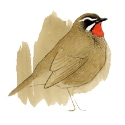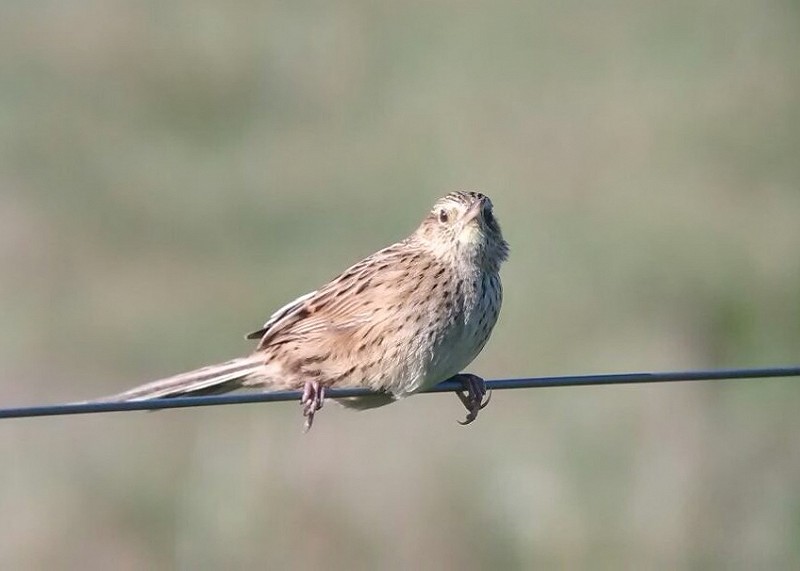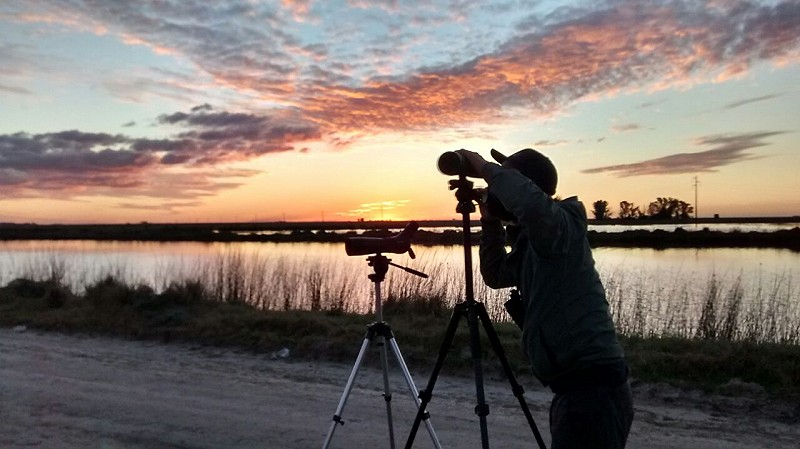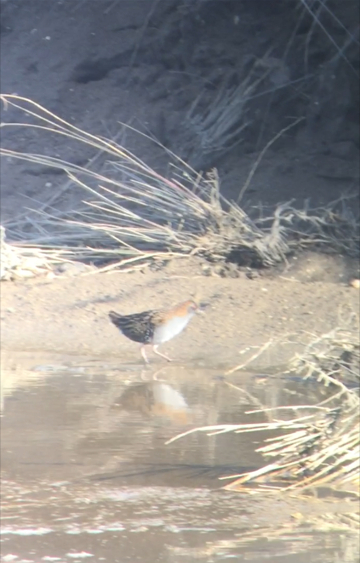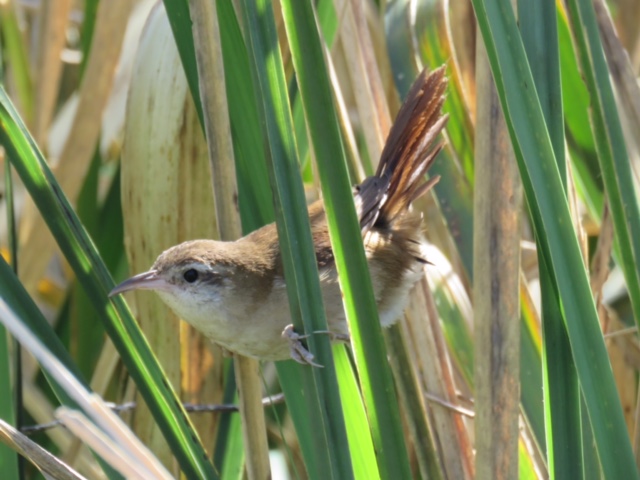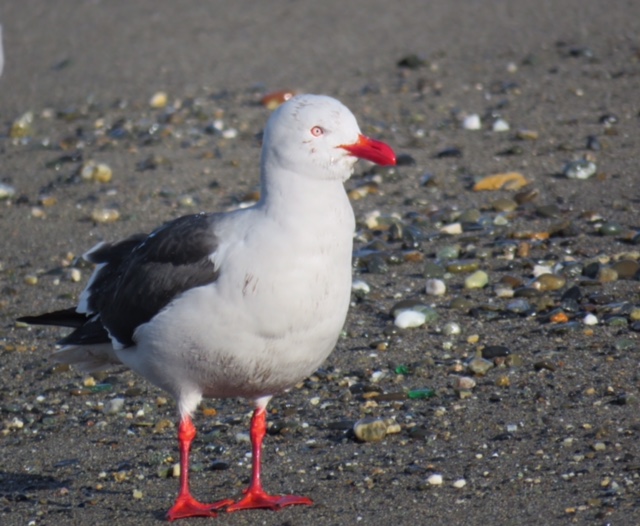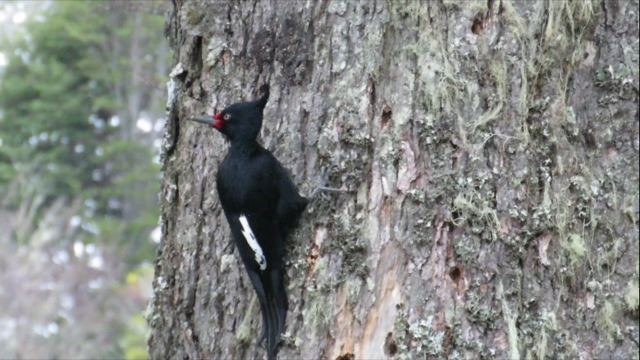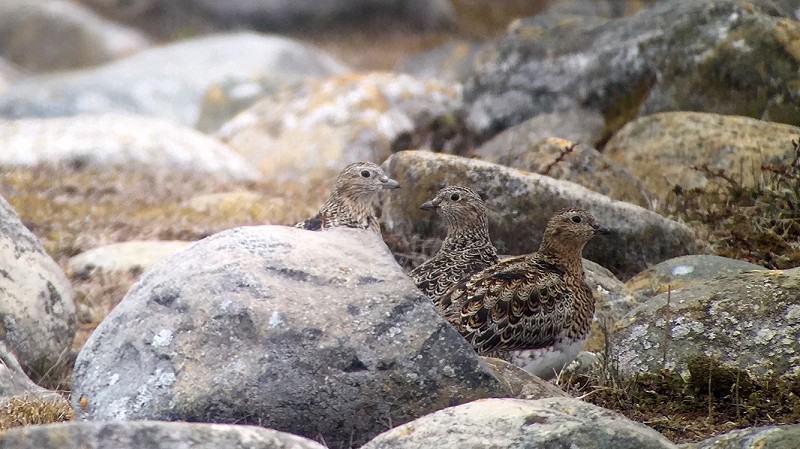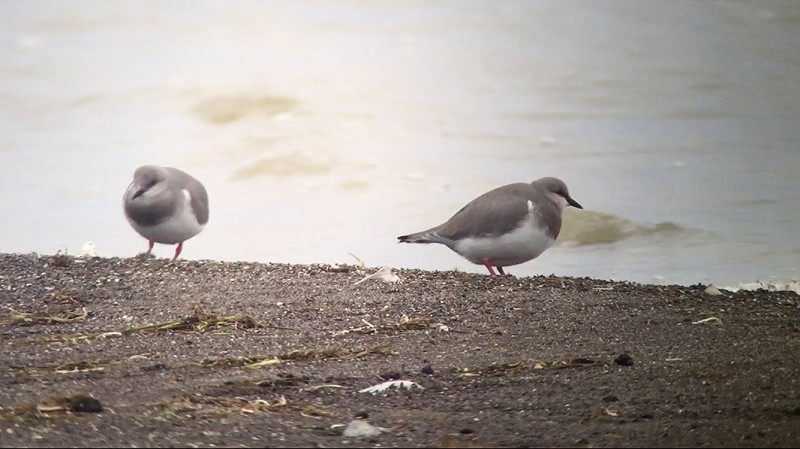PLEASE MAKE A DONATION NOW!
world.observation.org/arjan
www.arjandwarshuis.com/#biggestyear
August 17th BIRDING THE PAMPAS GRASSLANDS
Last night I was picked up from the airport of Buenos Aires by Diego Monteleone and together we drove four hours south to the town of Lavalle, near the famous vagrant hotspot of Punta Rasa.
After just a couple of hours of sleep it was time to start birding! We started at Diego’s stakeout for the Hudson’s Canastero, his personal favourite pampas endemic. We quickly found this pampas counterpart of the puna Scribble-tailed Canaster, which I saw less than a week ago near Tucuman. Like last weeks’ Scribble-tailed-, the Hudson’s gave outstanding views. Another fantastic furnarid added to an already impressive year list of this family.
Next we drove a short distance to the grasslands of Palenque Farm and to our big surprise we found a flock of over a 100 summer-plumaged Rufous-chested Plovers! To make the wader bonanza complete, we found more than 30 Tawny-throated Dotterels and several Least Seadsnipes on the same field! Awesome stuff!
After checking out some classic pampas flocks of ducks, Black-necked Swans and Coscorobas we went after some furnarids again. Both Freckle-breasted Thornbird and Sulphur-bearded Spinetail were quickly taped out from their grassy hideout.
Punta Rasa itself proved rather uneventful, but the vunerable Olrog’s Gull – my main target – was easily found among the larger and more abundant Kelp Gulls.
I knew that Diego was the man to find the highly elusive Dot-winged Crake. A salt water marsh endemic which sound was unknown until Diego recorded it for the first time last year!
The grass looked dry and there was a strong wind, so chances of finding the crake were slim. But as Diego played the tape alongside a small salt water inlet, I suddenly saw something running our way, a crake! That must have been it! Luckily the bird came out again and showed for over a minute, an unforgettable sighting. Of course I’d forgotten my camera in the car, so all I could master was a blurry video still through my binoculars.
August 18th HUNTING THE REEDHAUNTER
After finding almost all of my targets yesterday – much faster than I held possible - my possibilities for today were limited to just a handful of new species.
Because around Punta Rasa only common Nearctic waders would mean new additions for my year, Diego and I decided to look for the localized Curve-billed Reedhaunter in a small reserve near Buenos Aires (there was simply no time to look for Straight-billed Reedhaunter north of Buenos Aires since I had to catch my 6 PM connecting flight to Punta Arenas… (but if I could have looked into the future...).
We arrived at this lovely small reserve – although looks can be deceiving cause most of the flora at this site is actually non-native – and after bagging my only other new possibility for today – Tufted Tit-spinetail – the search for the Reedhaunter began.
At a small patch of native reeds and scrub we rolled the tape hoping for the best and behold, out came the most cooperative Curve-billed Reedhaunter ever! A fantastic finish to my 15 days in Argentina!
In retrospect the Straight-billed Reedhaunter would have been possible too since my flight was cancelled, meaning that I had six hours to kill on Buenos Aires Airport…
August 19th GOING FAR SOUTH!
Around 9 AM – just after sunrise – I touched down in Patagonia. Luckily my delay in Buenos Aires wouldn’t cost me any birding time :).
An airport pickup sent by Far South Expeditions was already waiting for me and 20 minutes later I checked in at a hostel that overlooked the Magellanic Strait. I put my scope up on the balcony on the second floor for a short sea watch. This proved an excellent choice since there were unprecedented large numbers of Southern Fulmars foraging fairly close inshore, a species I did not expect to see at all this year! Other tubenoses were several dozens of Southern Giant Petrels, a couple of Black-browed Albatrosses, an unfortunately too far to identify Diomedea albatross and best, two Magellanic Diving-petrels.
At 2:30 PM I was picked up by Far South Expeditions top guide Sebastian Saiter and together we took a taxi to a small wetland at the eastside of Punta Arenas. The temperature was around zero and snow and ice was everywhere, what a change of scenery!
I got a great introduction to Patagonian birding with large numbers of Ashy-headed- and Upland Geese, Black-faced Ibisses and a totally unexpected Lesser Horned Owl!
Around the coastline birding was particularly great with large numbers of the exquisite Dolphin Gull and my first Rock- and Imperial Shags and Flying- and Fugean Steamer Ducks. In Patagonia there are not that many new birds for me to find, but about every bird is unique and very cool. Sebastian even told me that tomorrow I maybe have a chance to see Magellanic Plover…
August 20th A TRIO OF VERY SPECIAL BIRDS
Far South Expeditions had kindly sponsored me a full day of birding with Sebastian Saiter around Punta Arenas. In the morning we were heading 60 kilometres southwest of town to look for Patagonian forest birds and in the afternoon we would travel 60 kilometres northeast of town to bird the Patagonian steppe. Normally this excellent single day tour is done in summer, but today we would prove that winter birding in Patagonia can be just as exciting!
As we drove west towards the Patagonian Forest we witnessed a breath-taking sunrise over the Magellanic Strait, it seemed like the entire horizon was on fire!
The first new birds for today were found along the windswept Patagonian coastline, Blackish Oystercatcher and Kelp Goose. Best was a pair of the monotypic Bronze-winged Ducks standing on an icy river.
As soon as we set foot in the beautiful Patagonian evergreen beach forest we heard the call of one of my most wanted birds, the huge Magellanic Woodpecker! Not long thereafter we were watching two females and a male of this beast-of-a-woodpecker foraging five meters away at eyelevel, magnificent!
Other great birds in the forest were Thorn-tailed Rajadito, Fire-eyed Diucon, Austral Parakeet and Magellanic Tapaculo.
As we were heading west again Sebastian suddenly yelled ‘stop’! Next to the car were three Ruddy-headed Geese! What a great find! This charismatic little goose is critically endangered on mainland South America due to predation from Grey Foxes, street dogs and habitat destruction. Luckily the population on the Falklands is still doing well, but a recent study shows that both populations may be considered separate subspecies.
In the afternoon we found ourselves on the windswept Patagonian steppe on the shore of huge icy lake, home of the Magellanic Plover. This very special wader was recently placed in its own monotypic family and for any birder visiting Patagonia it is one of the most wanted birds to find. I thought my chances in the middle of winter were very slim, but luckily Sebastian was optimistic!
The strategy to finding this awesome species is to slowly walk along the stony edge of the lake and scan ahead. After an hour of walking and seeing literally nothing I was beginning to loose hope. Then it happened, Sebatian suddenly froze, crouched down and pointed ahead of us. There was a family of White-bellied Seedsnipes, one of the most difficult to find birds in Patagonia! We watched these brilliant birds for half an hour foraging barely 10 meters from us and then we continued our search for the plover.
Barely five minutes later we saw two lonely waders standing at the lakeshore, could it be? Unbelievably enough there we two Magellanic Plovers! I couldn’t believe my eyes. We watched the birds for half an hour until my fingers started to freeze and my phone died of phone-scoping in the sub-zero temperature :). Stupidly enough I’d left my camera in the car so luckily I had my trusty Swarovski ATX65 telescope to film this magical moment! Thanks Vogelinformatiecentrum Texel and Swarovski for this fantastic equipment, I couldn’t have done it without you guys.
What an amazing day with Far South Expeditions! I can recommend any birder visiting Punta Arenas – winter of summer – to book this fantastic tour!
Arjan Dwarshuis
PLEASE MAKE A DONATION NOW!
world.observation.org/arjan
www.arjandwarshuis.com/#biggestyear
